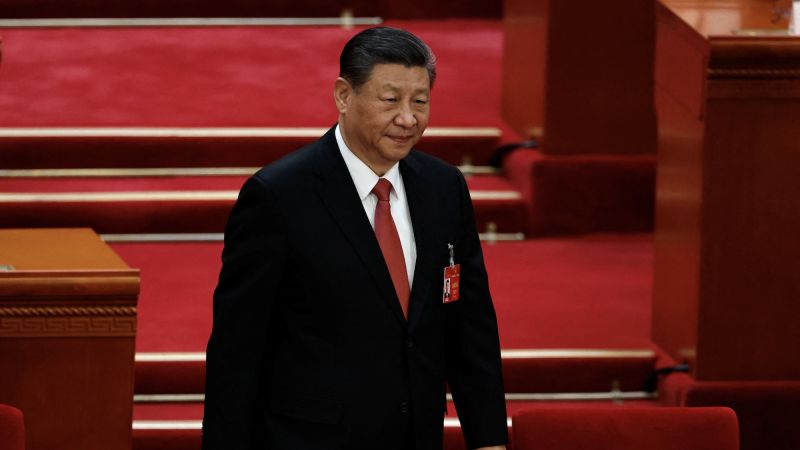[ad_1]
Editor’s Notice: Join CNN’s Meanwhile in China newsletter which explores what it’s essential know concerning the nation’s rise and the way it impacts the world.
Hong Kong/Taipei
CNN
—
Chinese language chief Xi Jinping met greater than a dozen US CEOs and teachers on Wednesday as Beijing renewed efforts to woo again international buyers and mend strained relations with america.
Overseas direct funding in China has slumped in current months as a mixture of slower development, regulatory crackdowns, onerous nationwide safety laws and questions concerning the nation’s long-term prospects have shaken confidence on this planet’s second largest financial system.
The group of CEOs included Cristiano Amon of Qualcomm (QCOM), Raj Subramaniam of FedEx (FDX) and Stephen Schwarzman of the Blackstone Group (BX).
Xi invited US companies to “proceed to put money into China” and pledged additional reforms to open the nation’s markets to international corporations, in line with a readout of the assembly printed by the international ministry.
“China’s development prospects are brilliant, and we’ve the boldness,” he mentioned, including that nation’s financial system has not but peaked.
Xi additionally referred to as for “a greater future” between China and the US. “Whether or not it’s conventional fields corresponding to financial system, commerce and agriculture, or rising fields corresponding to local weather change and synthetic intelligence, China and america ought to assist increase one another’s improvement.”
Bilateral relations have already proven enchancment since he met with US President Joe Biden in San Francisco in November, Xi added.
The assembly at Beijing’s Nice Corridor of the Individuals got here after the shut of a significant authorities discussion board that has invited international enterprise leaders to interact with Chinese language authorities officers over a few years.
About 100 international CEOs, in addition to the heads of worldwide organizations such because the Worldwide Financial Fund and the World Financial institution, had been within the Chinese language capital this week for the annual China Improvement Discussion board. Greater than 30 of them are US executives, in line with Chinese language state media.
Beijing is making an attempt to revive confidence and stabilize international commerce and funding because the nation faces its largest financial challenges in a long time. It has rolled out a series of measures since final 12 months, together with a 24-point motion plan published by the cabinet earlier this month, to draw international funding and broaden market entry in high-tech sectors.
However international buyers stay cautious of China’s rising scrutiny of Western corporations in addition to a structural slowdown.
Within the first two months of 2024, international direct funding (FDI) into the nation shrank almost 20% from a 12 months in the past, underscoring weak confidence amongst international executives.
That fall got here after a decline of 8% in 2023, in line with the Commerce Ministry.
One other gauge of FDI — direct funding liabilities — confirmed a 82% hunch in 2023, in line with figures launched by the State Administration of Overseas Alternate. It was the bottom in 30 years.
In line with a survey launched by the American Chamber of Commerce in China final month, 57% of US corporations lacked confidence that China would additional open its markets to international corporations.
China has set this 12 months’s financial development goal at round 5%, the identical as final 12 months’s. However market watchers say the objective is “formidable,” given a scarcity of main stimulus measures by the central authorities to immediately handle Chinese language customers’ weak confidence and their unwillingness to spend cash.
The world’s second largest financial system is plagued by a myriad of problems. They embody a chronic downturn in actual property, deflation, debt, a shrinking inhabitants and a shift in financial coverage in the direction of ideological targets that has rattled the personal sector and scared away international buyers.
[ad_2]
Source link





